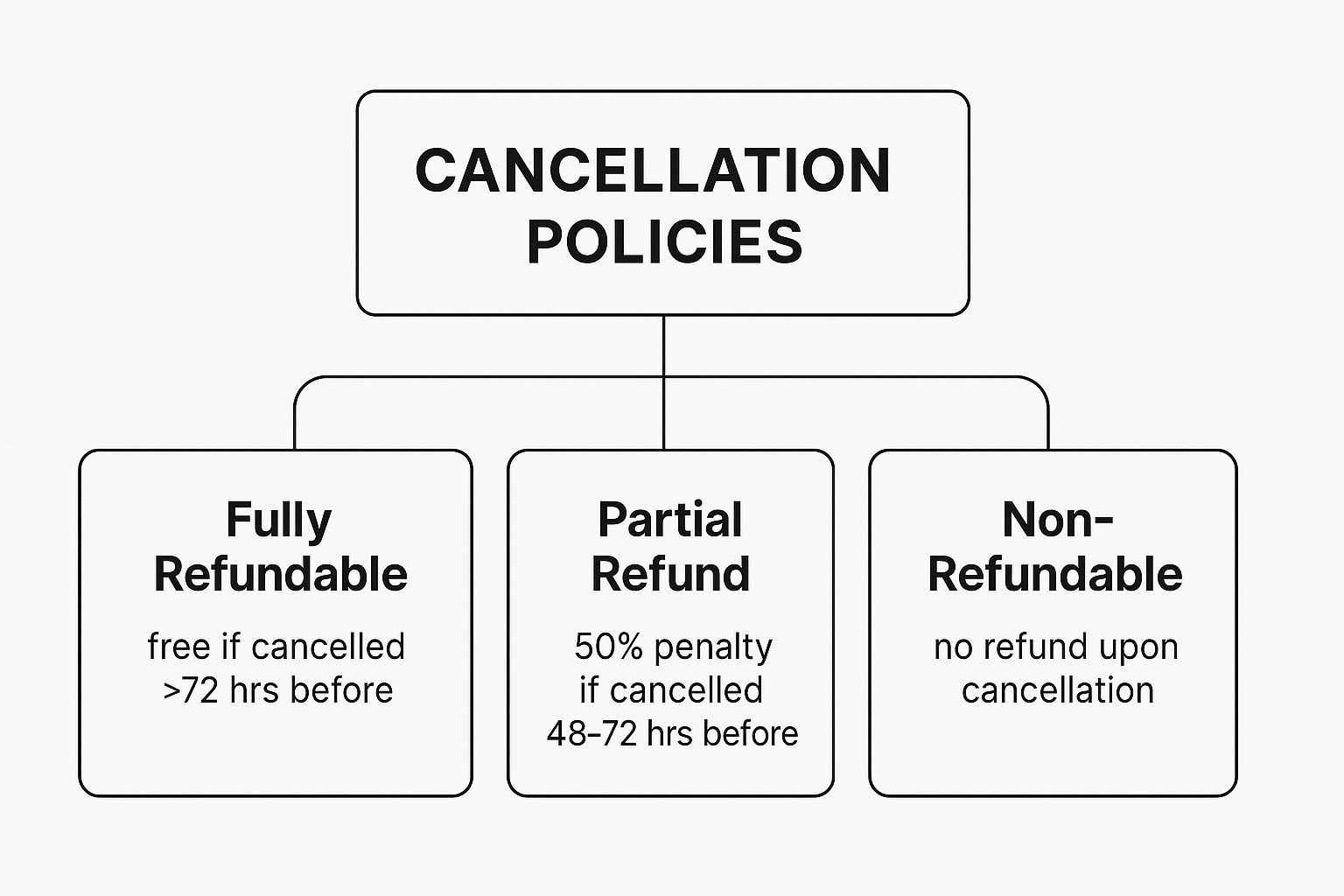Staring at that ‘Book Now’ button can feel like a real gamble. Is this a great deal, or am I locking myself into a financially risky plan? It all comes down to the fine print—the hotel cancellation policies that dictate whether you can get your money back if life gets in the way.
Why Understanding Hotel Cancellation Policies Matters More Than Ever

Learning to navigate hotel cancellation policies has become a crucial skill for any modern traveler. It’s not just about skimming the terms anymore; it’s about understanding the constant tug-of-war between a hotel’s need to keep rooms filled and your need for a little wiggle room. This tension is at the heart of every single booking you make.
From the hotel’s side of the counter, these policies are a lifeline. For anyone in the accommodation business, a solid cancellation policy is a cornerstone of good vacation rental revenue management. It’s what protects them from the financial hit of a last-minute cancellation or a no-show, which can leave rooms sitting empty and unsold. Without these rules, their income would be all over the place.
The Power Shift Toward Traveler Flexibility
But in recent years, the game has changed. The rise of online travel giants like Booking.com and Expedia has cranked up the competition, pushing hotels to offer more traveler-friendly terms just to stand out. We, as travelers, have come to expect—and even demand—options that won’t penalize us if our plans suddenly change.
This shift is being driven hard by younger travelers. Eye-opening research shows that 66% of Gen Z and 64% of Millennials actively hunt for flexible cancellation options. Many are even willing to pay a little extra for that peace of mind. This “cancellation culture” has become so widespread that for some online travel agencies, cancellations make up a huge chunk of their booking activity. For instance, recent reports showed that cancellations on Booking.com hit a staggering 40% of revenue in some Asia-Pacific markets.
Key Takeaway: Today’s booking world is defined by the tension between a hotel’s financial security and a traveler’s demand for flexibility. Knowing this helps you book smarter.
This guide is your roadmap to mastering these policies. We’re going to walk through everything you need to know, so you can book with confidence and sidestep those frustrating, costly surprises.
Here’s what you’ll learn:
- How to spot the different types of policies, from fully flexible to strictly non-refundable.
- The secret to decoding the confusing jargon often buried in the fine print.
- What to do to navigate the cancellation process when your plans go sideways.
By the time you’re done, you’ll have the skills to choose the right booking for your trip, every single time.
The Hidden History of Hotel Cancellation Rules

The hotel cancellation policies we navigate today didn’t just pop up overnight. They’ve evolved from a long history shaped by one timeless problem for hoteliers: an empty room is a room that makes zero dollars. Before the internet, booking was a manual, high-stakes game, and the rules were much, much stricter than what we’re used to.
Just picture it: you’re booking a room in an era of handwritten ledgers and rotary phones. There were no instant notifications or fancy pricing systems. A cancellation meant a hotel clerk had to physically erase a name from a book and cross their fingers that a walk-in or a last-minute call would fill the spot. This constant uncertainty gave birth to some seriously rigid cancellation rules.
To shield themselves from lost revenue, hotels leaned heavily on two things: mandatory deposits and very long cancellation windows. Guests often had to pay a chunk of money upfront just to hold the room, making their commitment financially binding from the get-go.
The Age of Strict Policies
Back then, hotel cancellation policies were built almost exclusively for the hotel’s benefit. Guest flexibility wasn’t just an afterthought—it was barely a thought at all. These rules were designed to be a powerful deterrent, discouraging anyone from canceling and making hotel revenue as predictable as possible.
These old-school rules were a direct response to the market realities and logistical headaches of the time. Hotels commonly required notice several days—or even weeks—in advance to avoid steep penalties. For example, many properties insisted that any changes happen at least three business days before arrival. You can read more about these historical booking logistics on tms.org.
These older policies often included:
- Long Cancellation Windows: It wasn’t unusual to see 72-hour, one-week, or even 14-day cancellation requirements, especially for resorts or during holidays.
- Forfeiture of Deposits: If you canceled too late, you automatically lost your deposit—no questions asked. This could be a pretty significant amount of money.
- Fees for Early Departures: Thinking about checking out a day early? Many hotels would hit you with a penalty, since rebooking that room for a single night was next to impossible.
The Digital Revolution Reshapes the Rules
Everything changed with the arrival of the internet and the rise of Online Travel Agencies (OTAs) like Expedia and Booking.com. All of a sudden, hotels were competing on a global stage. Travelers could compare dozens of options with just a few clicks, and this completely flipped the power dynamic.
OTAs quickly figured out that flexible cancellations were a huge selling point. Offering “Free Cancellation” removed the risk for travelers and made them far more likely to click that “book now” button. If a hotel wanted to reach the millions of customers browsing these platforms, they had no choice but to play by the new rules.
The shift was dramatic. What was once a system designed to protect hotels from uncertainty became a competitive arena where flexibility became the prize for travelers.
This forced a massive evolution in the industry. Hotels had to adapt their hotel cancellation policies or risk getting filtered out of search results entirely. While the super-strict, non-refundable rates still exist—usually offered at a discount—they are now just one choice among many. Understanding this journey from rigid protectionism to competitive flexibility is key to understanding why you see such a wide variety of terms today.
Decoding the Different Types of Cancellation Policies
When you book a hotel, you’re doing more than just reserving a room—you’re entering into an agreement. The heart of that agreement is the hotel cancellation policy, which lays out the rules of engagement if your plans suddenly change. Think of these policies like different tiers of a service plan; each one strikes a different balance between what you pay and how much flexibility you get.
Trying to figure out which one to pick can feel like reading a foreign language at first, but it’s simpler than it seems. Most policies boil down to three main types: flexible, semi-flexible, and non-refundable. Getting a handle on the trade-offs is the key to choosing wisely and avoiding any nasty surprises on your credit card statement.
Flexible Policies: Your Safety Net
Flexible cancellation policies, often advertised as “Free Cancellation,” are by far the most traveler-friendly option out there. They’re built for people whose plans are written in pencil, not pen.
Think of a flexible policy like having a get-out-of-jail-free card. You have the freedom to change your mind right up until the last minute without a financial penalty. Typically, this means you can cancel your booking for a full refund as long as you do it outside a specific window, like 24, 48, or 72 hours before check-in.
These policies are a perfect match for:
- Trips where your itinerary is still a work in progress.
- Booking way ahead of time when life’s uncertainties are a given.
- Any situation where you just want maximum peace of mind.
So, what’s the catch? This flexibility usually comes at a higher price. Hotels charge a premium for these rates because they’re the ones taking on the risk of a last-minute empty room. You’re essentially paying a little extra for the privilege of being able to back out.
This breakdown shows how the different hotel cancellation policies stack up and what penalties you might face.

As you can see, the closer it gets to your check-in date, the more you stand to lose if you have to cancel.
Non-Refundable Policies: The High-Risk, High-Reward Option
On the complete opposite end of the spectrum, you have non-refundable policies. These are the “final sale” items of the travel world. Once you click “book,” your money is locked in, whether you show up or not.
A non-refundable booking is a simple trade: you get a much lower price in exchange for giving up your right to get your money back.
Why on earth would anyone pick such a strict option? It all comes down to saving money. Hotels love these bookings because they guarantee revenue, and they pass some of that financial security on to you as a deep discount.
This option makes a lot of sense if:
- Your travel plans are 100% confirmed and set in stone.
- You’re booking a spontaneous, last-minute trip.
- Your budget is the absolute top priority, and you’re willing to roll the dice.
Just be absolutely certain before you commit to a non-refundable rate. If your plans go sideways for any reason, you’ll almost certainly lose the entire amount you paid.
Semi-Flexible Policies: The Middle Ground
Right between the freedom of flexible rates and the rigidity of non-refundable ones, you’ll find the middle path: semi-flexible policies. These are hybrid deals that try to offer a compromise between cost savings and a little bit of security.
A common semi-flexible policy might work on a sliding scale. For instance:
- Get a full refund if you cancel more than a week out.
- Get a 50% refund if you cancel within 3-7 days of check-in.
- Get no refund if you cancel within 48 hours of your arrival.
Another popular setup is the one-night cancellation fee. With this policy, if you cancel after the deadline has passed, you aren’t on the hook for the whole stay—just the cost of the first night. It’s a common approach that covers the hotel’s immediate loss without being as harsh as taking the full amount.
These policies are a great fit for travelers who feel pretty good about their plans but still want a small safety net just in case. You’ll save some cash compared to a fully flexible rate but won’t risk losing everything like you would with a non-refundable booking. The trick is to read the fine print carefully to know exactly when the penalty deadlines kick in and how much you have to lose.
The Fine Print: Key Terms You Need to Know
When it comes to hotel cancellation policies, the devil is absolutely in the details. You might feel like you’ve got a handle on the basic policy types, but it’s the specific terms tucked away in the fine print that can really make or break your booking.
Getting a grip on this vocabulary is the key to avoiding nasty surprises and booking with real confidence. Let’s break down the most important terms you’ll run into, looking at what they actually mean for you in the real world.
No-Show Penalty
A no-show penalty is what you get hit with when you don’t cancel and you don’t show up. Think of it like ghosting a reservation at a fancy restaurant; they held a spot for you, lost out on other business, and you never called. It’s a costly mistake to assume that just not arriving is the same as a late cancellation.
With a late cancellation, you might get charged for the first night. But a no-show? That often means you’re on the hook for the full cost of the entire reservation. Hotels do this because they kept that room empty for you, turning away other paying guests. My advice? Always, always formally cancel, even if you know you’re past the deadline. It can sometimes lead to a smaller charge than just disappearing.
Booking Deposit vs. Prepayment
These two sound almost the same, but they work very differently. Getting them straight is vital for managing your travel budget and knowing exactly what’s on the line if your plans change.
- Booking Deposit: This is like a security deposit. You pay a piece of the total cost upfront just to lock in your room. If you cancel within the rules, you usually get this money back. If you cancel late, you might only lose the deposit itself, not the cost of the whole stay.
- Prepayment: This means you’re paying for the entire stay ahead of time, typically right when you book. Prepayments are almost always tied to non-refundable rates. If you see “prepayment required,” that’s a huge red flag that you’re looking at a “final sale” kind of deal.
Think of it this way: A deposit is a down payment to hold your room, which you might get back. A prepayment is paying for the room in full upfront, which you almost certainly won’t get back if you cancel.
Force Majeure Clause
This fancy legal term is your potential lifeline when a true crisis hits. A force majeure clause is designed to cover extraordinary, unforeseeable events that are completely out of anyone’s control. It’s the policy’s way of saying, “Okay, sometimes life throws a massive curveball.”
We’re talking about major events like:
- Natural disasters (hurricanes, earthquakes, wildfires)
- Government-ordered travel bans
- Widespread political chaos
- Global health crises (like a pandemic)
If a covered force majeure event wrecks your travel plans, the hotel might waive its usual cancellation fees and offer you a full refund or credit for a future stay. Be warned, though: this clause won’t cover your personal problems, like a last-minute work conflict or a common cold. It’s reserved for truly exceptional circumstances that make travel impossible or dangerous for everyone. Always check if a policy has one—it’s a critical layer of protection against the truly unexpected.
How Your Booking Method Affects Your Cancellation Options

Does it really matter if you reserve a room straight from the hotel’s website or click through a giant platform like Expedia? Absolutely. The path you take to book your stay can completely change your experience if you need to cancel, opening up different options and potential headaches.
Think of it like buying concert tickets. You can go straight to the venue’s box office or use a third-party reseller. Both get you in the door, but if the show gets canceled, who you have to call and what rules apply are entirely different. The same logic applies to hotel cancellation policies.
Booking Direct: The Hotel’s Rules
When you book directly with a hotel, whether on their website or over the phone, you’re making a straightforward deal. The only cancellation policy that matters is the hotel’s. This direct line of communication is a huge plus if your plans go sideways.
If you need to cancel or change your reservation, you deal directly with the hotel staff. This can make any negotiation much, much simpler, especially if you have a unique situation. A polite phone call explaining a personal emergency might convince a manager to waive a fee or offer you a future credit—a level of personal touch a massive third-party site often can’t match. You can learn more about the benefits of booking directly with hotels in our detailed guide.
The flip side? The hotel’s own policies might seem less flexible on paper. Without the pressure to compete on a huge platform, they might not offer the same ultra-lenient cancellation windows you see advertised on major travel sites.
Booking with an Online Travel Agency: The Middleman
Online Travel Agencies (OTAs)—think Booking.com, Expedia, and Agoda—act as powerful middlemen. To win your business in a crowded market, they often push for or simply advertise more flexible hotel cancellation policies. That “Free Cancellation up to 24 Hours Before” banner is a pretty powerful marketing tool.
The trade-off for the often better price and flexibility of an OTA is an added layer of complexity. When you book through an OTA, you are subject to two sets of rules—the OTA’s and the hotel’s.
This two-policy system can create real confusion. If you need to cancel, you have to go through the OTA’s website or app. The hotel will almost always send you right back to the service you booked with, since the third party controls the reservation and your payment. It can be frustrating when all you want is a quick answer.
The data shows just how much these platforms dominate booking changes. One study found the vast majority of cancellations happen through OTAs, with Booking.com alone accounting for a massive 57% and Expedia for 26%. This tells us that while OTAs offer great flexibility, they are also the epicenter of canceled plans. To handle this, many properties now use vacation rental management software to manage bookings and cancellations from all these different channels at once.
Ultimately, the best choice depends on what you value most. If you want direct customer service and the chance for a human-to-human conversation, book direct. If your priority is finding the best price with the most flexible upfront terms, an OTA is often the way to go—just be ready to work through their system if issues come up.
Your Step-by-Step Guide to Canceling a Reservation
So, your travel plans have changed. It happens to the best of us. Knowing the right way to cancel a hotel room can save you from a major headache and keep your money in your pocket. Navigating hotel cancellation policies doesn’t have to feel like deciphering a secret code. With a clear plan, you can handle it like a pro, even when things get a little messy.
This guide will walk you through exactly what to do, step by step.
The Standard Cancellation Process
First things first: act fast. The second you know you need to cancel, it’s time to find that booking confirmation email. Think of this email as your roadmap—it holds all the critical details about your hotel’s specific cancellation policy.
Now, hunt for the cancellation deadline. Is it 24, 48, or 72 hours before check-in? This date and time is the most important piece of information you need. Missing that window, even by a few minutes, can be the difference between getting a full refund and being charged for a night you never used.
Next, make sure you cancel through the right channel. If you booked your room through an Online Travel Agency (OTA) like Expedia or Booking.com, you have to use their website or app to process the cancellation. Booked directly with the hotel? Then you’ll either use the hotel’s website or give them a call.
Pro Tip: Once you get a cancellation confirmation email or number, take a screenshot. Seriously. This little piece of digital proof can be a lifesaver if a dispute pops up later.
What to Do When Things Go Wrong
Sometimes, even when you do everything right, you might still get hit with an unfair charge. Maybe the hotel’s system didn’t register your cancellation on time, or there’s a dispute over the refund amount. Don’t panic—just get organized. A calm, strategic approach is your best bet for getting it sorted out.
Follow these steps to dispute a charge:
- Gather Your Evidence: Pull together all your documents. This means your original booking confirmation, the cancellation confirmation (that email or screenshot you saved!), and any notes from phone calls, including dates, times, and who you spoke to.
- Contact the Right Party First: If you used an OTA, their customer service is your first stop. If you booked direct, get in touch with the hotel’s front desk or reservations manager. Clearly and politely explain the situation and present your proof.
- Put It in Writing: After any phone call, send a follow-up email summarizing the conversation. This creates a paper trail you can refer to if you need to take things further.
- Escalate If Necessary: If you’re not getting anywhere with the hotel or OTA, it’s time to bring in the big guns: your credit card company. File a dispute and provide them with all the evidence you’ve collected. They’ll launch an investigation for you.
Knowing these steps empowers you to handle pretty much any cancellation scenario. Of course, while a good cancellation policy is key, getting a great price from the start is just as important for a successful trip. For more tips on that, check out our guide on how to get the best deal on booking a hotel. This playbook gives you the confidence to manage any reservation from start to finish.
Frequently Asked Questions About Hotel Cancellations
Even when you’ve got the basics down, wading into the fine print of hotel cancellation policies can feel like navigating a maze. A lot of “what if” scenarios pop up, and when plans change unexpectedly, confusion can quickly turn into stress.
Let’s clear the air. We’ve rounded up some of the most common questions travelers have about cancellations. Think of this as your go-to guide for quick, straight-to-the-point answers when you need them most.
Can I Get a Refund on a Non-Refundable Hotel Room?
The term “non-refundable” is usually a hard and fast rule, but there are a few rare exceptions where you might have some wiggle room. Your first and best move is always to call the hotel directly. Explain your situation calmly and politely—a little kindness can go a long way.
If you’re dealing with a documented emergency, like a sudden illness or a major event covered by a force majeure clause, you might have a case. This is also where your travel insurance could kick in. Even if a cash refund isn’t on the table, a manager might offer a credit for a future stay as a gesture of goodwill. Some travelers have also had luck with room resale sites, but you’ll need to confirm with the hotel that they even allow name changes on bookings first.
What Happens If I Cancel After the Deadline?
Once that free cancellation window slams shut, you’re almost guaranteed to face a penalty. This is all laid out in the terms you agreed to when you clicked “book.”
The most common penalty for a late cancellation is a charge for one night’s stay. But if you booked a super-strict rate or a non-refundable room, you could lose the entire cost of the reservation.
It’s also worth remembering that being a “no-show”—just not turning up without formally canceling—is often treated the same way, or sometimes even worse. It’s always better to officially cancel, even if you know you’re past the deadline.
Does Travel Insurance Cover Hotel Cancellation Fees?
Yes, but there’s a big “if.” Travel insurance only covers you for specific, pre-approved circumstances listed in your policy, often called “covered reasons.” These are typically major, unforeseen events that make it impossible for you to travel.
Common covered reasons usually include things like:
- A sudden, severe illness or injury (for you or a close family member).
- A death in the family.
- Extreme weather events that completely shut down travel.
What it won’t cover is a simple change of heart, a conflict at work, or coming down with a minor cold. For that level of freedom, you’d need a much pricier “Cancel for Any Reason” (CFAR) policy add-on. Always, always read the fine print of your insurance plan before you buy, so you know exactly what you’re protected against.
At HotelsEscape, we’re all about helping you travel with confidence. From decoding tricky policies to sharing travel inspiration and uncovering the best deals, we bring you the insights you need for your next great adventure. Check us out at https://www.hotelsescape.com for more.




